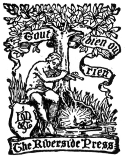This text includes Greek characters, e.g. Οὐκ ἔοικε. You may need to select a differentbrowser font to display them properly. Mouse over the Greek to display a transliteration.
THROUGH NATURE
TO GOD
BY
JOHN FISKE
Sur des rameaux trop frêles,
Qui sent ployer la branche et qui chante pourtant,
Sachant qu'il a des ailes!
Victor Hugo

BOSTON AND NEW YORK
HOUGHTON, MIFFLIN AND COMPANY
The Riverside Press, Cambridge
1900
COPYRIGHT, 1899, BY JOHN FISKE
ALL RIGHTS RESERVED
TO THE BELOVED AND REVERED MEMORY
OF MY FRIEND
THOMAS HENRY HUXLEY
THIS BOOK IS CONSECRATED

PREFACE
A single purpose runs throughout this little book, though differentaspects of it are treated in the three several parts. The first part,"The Mystery of Evil," written soon after "The Idea of God," wasdesigned to supply some considerations which for the sake of concisenesshad been omitted from that book. Its close kinship with the second part,"The Cosmic Roots of Love and Self-Sacrifice," will be at once apparentto the reader.
That second part is, with a few slight changes, the Phi Beta Kappaoration delivered by me at Harvard University, in June, 1895. Itsoriginal title was "Ethics in the Cosmic Process," and its form ofstatement was partly determined by the fact that it was intended as areply to[Pg vi] Huxley's famous Romanes lecture delivered at the University ofOxford in 1893. Readers of "The Destiny of Man" will observe that I havehere repeated a portion of the argument of that book. The detection ofthe part played by the lengthening of infancy in the genesis of thehuman race is my own especial contribution to the Doctrine of Evolution,so that I naturally feel somewhat uncertain as to how far that subjectis generally understood, and how far a brief allusion to it willsuffice. It therefore seemed best to recapitulate the argument whileindicating its bearing upon the ethics of the Cosmic Process.
I can never cease to regret that Huxley should have passed away withoutseeing my argument and giving me the benefit of his comments. Thesubject is one of a kind which we loved to discuss on quiet Sundayevenings at his fireside in London, many years ago. I have observed onHuxley's part, not only in the Romanes lecture, but also in the charming"Prolegomena,"[Pg vii] written in 1894, a tendency to use the phrase "cosmicprocess" in a restricted sense as equivalent to "natural se